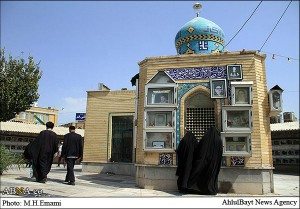Visiting the Qom Sheikhan cemetery in February this year was not my first and I pray, not my last. Tranquil, just as any other resting place, it was a stark contrast to my visit to Bath Abbey only a week before, where I casually and curiously read and learnt of the centuries ago Christians, laid to rest within or around the Abbey. Yet this place in Qom, also a resting place to many, had spiritually left a deep and profound effect. As I entered, my footsteps started to feel heavy, my thoughts ran deep. I felt a part of my own reality had been abruptly awakened, deep within my conscience. Here I was, in awe of visiting the final resting place of some exceptional masters of knowledge and spirituality, such as Ayatollah Mirza Jawad Maleki Tabrizi and Sheikh Mirza Qommi whom had utilised and lead fulfilling lives, dedicated to seeking and imparting knowledge while also self-purifying.
 Ayatollah Mirza Jawad Maleki Tabrizi was born in 1926 in Tabriz and passed away in 2006. He gained knowledge in Najaf and Qom and was taught under eminent scholars such as Ayatollah Al-Khoei and was taught Fiqh by the late Ayatollah Hajj Agha Reza Hamadani. Ayatollah Tabrizi also taught modern day greats such as Ayatollah Khomeini with whom he held private lessons, and Ayatollah Sayyid Husein Fatimi Qummi. Ayatollah Tabrezi was both a Mujtahid in fiqh, who had a Risala ‘Amaliyyah, as well as an Arif of the highest station. Known for his humility by his students and leading a simple life, he authored Spiritual Journey of the Mystics (Suluk al-Arifan).
Ayatollah Mirza Jawad Maleki Tabrizi was born in 1926 in Tabriz and passed away in 2006. He gained knowledge in Najaf and Qom and was taught under eminent scholars such as Ayatollah Al-Khoei and was taught Fiqh by the late Ayatollah Hajj Agha Reza Hamadani. Ayatollah Tabrizi also taught modern day greats such as Ayatollah Khomeini with whom he held private lessons, and Ayatollah Sayyid Husein Fatimi Qummi. Ayatollah Tabrezi was both a Mujtahid in fiqh, who had a Risala ‘Amaliyyah, as well as an Arif of the highest station. Known for his humility by his students and leading a simple life, he authored Spiritual Journey of the Mystics (Suluk al-Arifan).
In an excerpt from his book Asrarul Salaat (The Secrets of Daily Prayers), Ayatollah Mirza Jawad Maleki Tabrizi says: “I asked my mentor, who was the best philosopher, Arif and experienced teacher and the most perfect spiritual physician I have ever seen in my life; “Which one of the physical worshipping from your experience is more effective to the heart? He replied: long prostration for about an hour or ¾ of an hour in which you repeatedly say: “Laa Elaaha Ellaa Ant Sobhanaka Enni Konto Mena dhalemin.” (Translation: “There is none worthy of worship besides You. Glorified are You. Surely I am from the wrongdoers.”)
“When you recite it, you should observe your soul imprisoned in the jail of this world fastened with the chains of immoral behaviour. During the prostration you should glorify Allah and confess that you have been unfair to yourself not your Lord.”
Asrarul-Salaat p.46
Amongst authoring other books, it is the following account of a tragedy having occurred in the home of the respected Ayatollah, which taught me a lot, by his extraordinary actions:
On Eid al-Ghadir one year, as many guests were arriving in the home of the respected Ayatollah to convey their respects, a female servant discovered the dead body of the much loved son of Ayatollah Tabrizi floating inside the yard’s water pool. She starts crying loudly as do the other women of the household. Having heard the loud screams, Ayatollah Tabrizi comes to the backyard and sees the lifeless body of his beloved son. Yet, he controls himself and asks the women folk to also stop crying and the women become silent. The dead body is placed in a corner and they return inside the house in order to attend to the visiting guests. Some of the guests remained for lunch at his house. After lunch, when the guests asked permission to leave, Ayatollah Tabrizi says to some of his close friends: ‘Please don’t leave, I have to tell you something.’ When all the guests leave the house, he informs them about the tragedy of his son’s demise and seeks their help in making the necessary arrangements for the funeral.
Allah (swt) said: “The ascetic (not taking too much food or drinks, not self-indulgent) ones are the ones who do not get sad if his son dies….”
“The least I will give to the ascetic ones is that I will give them the keys to all the doors of heaven with which they can open any door they like”….
(Biharul Anwar, vol. 74 pg. 21-30)
Many lessons can be derived for our own lives from this lofty example of akhlaq. The honour and rights of guests when visiting our homes, the selflessness and patience in the most severe of occasions, especially in our duty towards others, for the sake of God’s commands. He exemplified so much humility on this single tragic day, that such a personality is indeed a beloved and humble servant of Allah swt. According to Seyyed Fatami-Nia, one night before the demise of Ayatollah Tabrizi in 2006, about 250 Sheikhs in Qom had dreamt that the funeral of Ayatollah Tabrizi was proceeding and Imam Husain (a.s) was walking in front of his coffin. Thus, my thoughts continued, while through their work and exemplary life they live on, immortal, who amongst us is living and who is, dead?
Are we, the ones walking this earth, in fact in a deep sombre sleep, a spiritual comatose, ignorant to the reality of existence and will be rudely awoken upon our physical death? We were created with a purpose – not haphazardly. Are we living & fulfilling our own purpose?
“What! did you then think that We had created you in vain and that you shall not be returned to Us?” (Quran 23:115)
We were created to perfect ourselves, our potential greater than the angels and yet the angels wondered upon our creation!
“And when your Lord said to the angels, I am going to place in the earth a khalif, they said: What! wilt Thou place in it such as shall make mischief in it and shed blood, and we celebrate Thy praise and extol Thy holiness? He said: Surely I know what you do not know”. (Quran 2:30)
Sadly, most of us have failed to uplift ourselves from our animalistic stage – spiritually weak, so easily giving in to our desires and vices, embroiled in a constant inner and outer battle.
“Nor do I absolve my own self (of blame): the (human) soul is certainly prone to evil, unless my Lord do bestow His Mercy: but surely my Lord is Oft-forgiving, Most Merciful.” (Quran 12:53)
I could not help but to ponder the fruitful lives these masters in the cemetery had led of learning, writing, refinement and self-purification. Such great examples for us to learn from, their knowledge combined with perfect examples of akhlaq (humility, patience, selflessness, servitude etc.) What achievements to date, can we put to our name? I walked away from the cemetery with my head sunk low, what worthy deeds will I even dare to ask to be rewarded the mercy of Allah? Yes He is ever generous, and that is what makes Him the lord and us lowly servants, but how astounding our levels of arrogance and self-assurance….the “I” within us gaining strength day by day….
A quote I heard recently, struck me, “There is no present like (the) time”. We are blessed to have time right now, we aren’t guaranteed time in the future. It’s imperative we focus on our journey, to acquire knowledge and also to perfect our inner selves/ morality – today – in the hope that we truly start living amongst the eternally living.
by Zahra Kazmi





